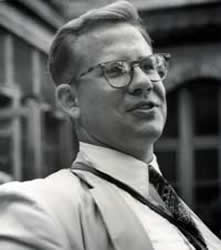

|

|
IN MEMORIAM
Ernest W. Adams
Professor of Philosophy, Emeritus
UC Berkeley
1926 – 2009
Ernest W. Adams died of inoperable liver cancer in Lakewood, Colorado, on March 29, 2009, after a long and fruitful career at the University of California, Berkeley.
On August 12, 1926, in the city of Los Angeles, he was born into an academic household. His father was a professor, and his father’s father was also a professor. It is not surprising that Ernest Adams’s own children would end up with academic positions.
Ernest Adams majored in electrical engineering at Stanford University, obtaining the B.S. degree there, before going on to do graduate work in philosophy at Stanford. He earned the Ph.D. in 1956, writing his dissertation under the supervision of the renowned philosopher of science Patrick Suppes. That same year, he joined the Department of Philosophy at Berkeley, where he remained until his retirement in 1991. In 1958, he and Alfred Tarski founded Berkeley’s pioneering interdisciplinary Group in Logic and Methodology of Science, which to this day runs one of the world’s premier graduate programs dedicated to the study of logic and foundations.
Over the years, Adams served on many departmental committees and was always a dedicated member of the logic group. At different times he served as its chair, and also as its graduate advisor. He supervised the dissertations of many logic group students. As a dissertation director, his students considered him to be open-minded and conscientious. Always eager to offer words of encouragement, as well as helpful suggestions, he was known for his genuine concern about the welfare of his students.
Adams was a productive researcher who authored over 50 articles and five books. The titles of some of the books he published exhibit the versatility of his scholarly work and the diversity of his interests. Archeological Typology and Practical Reality, published in 1992, was written with his brother William, and concerns the problem of classification in archeology. Another, The Geometry of Elections, was coauthored with his son James and published in 2009. It utilizes mathematical theories to analyze how people vote and investigates different voting systems.
Adams is best known in philosophy for his work on conditional statements, specifically on the relation between such statements and probabilities (especially conditional probabilities). He published many significant works on this topic, the best known of which is The Logic of Conditionals, a work of great insight and importance, which has been heralded as an “almost single-handed creation of a rich field of philosophical inquiry.” His theory of conditionals is regarded today as the dominant view of indicative conditionals.
Adams also produced very original work on the foundations of geometry. Although he began working in this area as early as 1961, his most important publication on this topic appeared in 2001 under the title Surfaces and Superposition. Concerned with the relation of geometrical concepts and propositions to practical procedures, this book makes use of topology to explain our everyday dealings with such things as surfaces, lines, and points. By delving, in a very sophisticated mathematical way, into our applications of measuring devices in geometry, Adams created a far-reaching and novel way of understanding Euclidean geometry. During his years at Berkeley, he also made important contributions to such fields as utility theory, game theory, general measurement theory, and foundations of physics.
Adams was a member of the American Academy of Arts and Sciences. He was awarded a National Science Foundation fellowship in 1965, and a Guggenheim Fellowship in 1967. He was also a fellow at the Stanford Center for Advanced Studies. His philosophical research was given a well-deserved testimonial in 1994 with the publication of a Festschrift containing contributions from an eminent group of philosophers who provided an insightful account of his work and its significance.
Adams is survived by his wife of 52 years, Anne, as well as two sons: James, professor of political science at the University of California-Davis, and William, a member of the Department of Visual Arts at the University of Colorado Denver. He is also survived by two grandchildren, Elias and Claudia, offspring of William.
Ernest Adams was a well-liked teacher, a highly respected scholar, a devoted husband, a prince of a father, and a loyal and trusted friend. He did much of lasting value for the University. He will be greatly missed by those who knew him well.
Charles Chihara 2009
Branden Fitelson